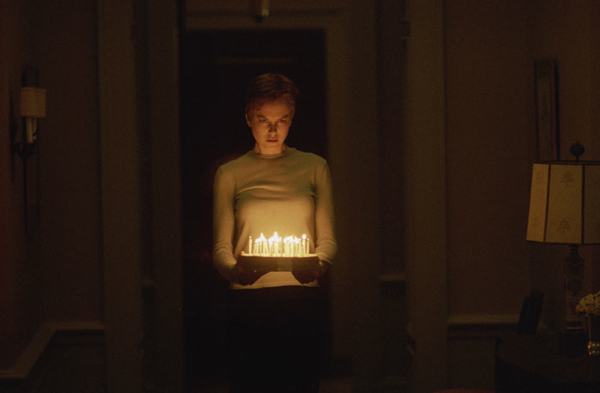Movie review by Greg Carlson
Jonathan Glazer’s new film “Birth” is an engrossing fairy tale filled with tremendous acting, stunning photography, and quite possibly the year’s best musical score. Ruminating on the metaphysical possibilities of reincarnation, or perhaps merely the desire that lost loved ones could come back to us, “Birth” works on nearly every level, despite its rather elephantine demand that we suspend all reason and doubt. Spare, austere, and quiet, “Birth” showcases multiple examples of gutsy, intelligent direction that confirm much of what was said about Glazer following his impressive debut feature “Sexy Beast.” “Birth” is an improvement over that solid film, and should guarantee the filmmaker some plum assignments in the near future.
The movie’s opening sequence, in which Harris Savides’ camera follows a runner in a wintry Central Park, is a beautiful, gliding composition that projects both a kind of elegiac majesty and a sense of foreboding and portent. Glazer takes his time with this jogger, and Alexandre Desplat’s spooky orchestrations underline the ways in which mundane routine can quickly transform into life-changing tragedy. Entering a tunnel, the runner falters and crumples to the ground. The viewpoint then switches to a newborn infant emerging into the world. It is an amazing set-piece, rendered all the more powerful by the title card that moves the story ten years ahead.
Nicole Kidman’s Anna was married to the dead runner, and despite her broken heart, has finally agreed to start over in a new marriage with her longtime, persistent beau Joseph (Danny Huston). Anna lives with her patrician mother Eleanor (played with a cunning combination of stateliness and wit by Lauren Bacall) in a mammoth Fifth Avenue spread, and other family members, including Anna’s sister Laura (Alison Elliot) and Laura’s husband Bob (Arliss Howard) never stray too far from Eleanor’s aristocratic keep. The wealth of the family emerges as a subtle class commentary that Glazer expertly exploits, and the film’s production design is a sight to behold.
Things get weird when a ten-year-old boy shows up at Eleanor’s birthday party claiming to be Anna’s dead husband Sean. Initially dismissed as a strange joke or an awkward coincidence, the lad’s declaration begins to assume disturbing credibility as he reveals more and more information that only Anna’s deceased husband could have known. The young Sean is played by Cameron Bright, and the pre-teen actor does a remarkably convincing job. Glazer enlisted the help of two top-notch screenwriters, Milo Addica (who co-wrote “Monster’s Ball”) and legendary Bunuel collaborator Jean-Claude Carriere, and the scribes really manage to make a preposterous premise resonate with feelings of numbing plausibility.
Kidman is the glue that holds the entire thing together, and her performance is another in a string of smart choices. Only when the movie vacillates between the supernatural aspects provided by Anna’s desire to believe in Sean and the crushing possibility that more realistic explanations are right before our eyes does Glazer’s spell break down. Fortunately, the director handles the denouement with the same conviction attached to everything that has come before. The result is a film that nearly tricks us into thinking it is merely a creepy horror trifle when it actually has much to say about faith, jealousy, and the constant ache of incomprehensible grief.
